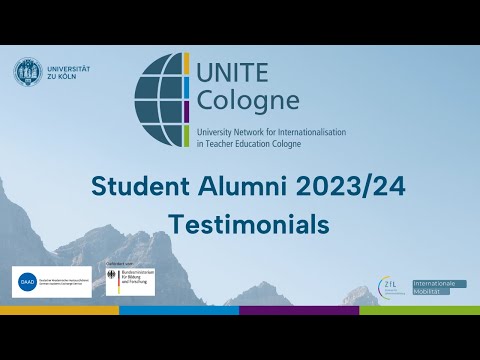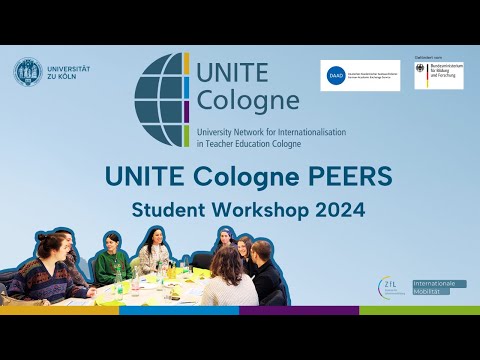- UNITE Cologne PEERS
- New approaches regarding peer involvement in international teacher education
- Peer-to-peer mentoring and exchange
- Networking and ongoing support
- Networking & exchange
- Further information & contacts
New approaches regarding peer involvement in international teacher education
The UNITE Cologne PEERS concept arose in response to challenging questions at the start of the pandemic in our first funding year: ‘What do we do now…? How can we enthuse student teachers to take part in international travel?’ The consequences of the global crisis made it clear: a total rethink was required. Our basic idea was simple, but its impact was fascinating: it involved networking the preselected and highly motivated scholarship holders as peers, providing them with professional mentoring and creating a tailor-made range of courses. The UNITE ‘inner circle’ was established as a network that conveys identity.

The peer-to-peer coaching by UNITE Cologne alumni is invaluable to the mentoring concept at the University of Cologne! It represents a genuine qualitative value added to the optimal preparation of outgoing Cologne teachers.Christiane Biehl, Head of the International Mobility Department, Deputy Head of the International Affairs Division, Project Manager of UNITE Cologne in the International Mobility Department
Student testimonials: insight into the UNITE Cologne scholarship programme

Please click on the preview image to activate the video. We would like to point out that data will be transmitted to the respective provider after activation. View on YouTube
The students developed digital formats with our assistance. The current peer concept is based on respectful exchange of experiences as equals: the UNITE alumni not only act as motivational peers for the future cohort, they also support incoming student teachers on their journey to Cologne. This intimate enthusiasm is of key importance to our peer format.

The peer-to-peer format has created an atmosphere of mutual respect and curiosity. This type of learning is still fresh in my memory, especially in light of my future vocational situation as a teacher. I’ll use my experiences to enable my pupils to learn from intercultural and group dynamic lessons.Maite Küpper, teaching post in Spanish and the Arts, UNITE scholarship holder in 2024
Student testimonials: impressions from Cologne
Peer-to-peer mentoring and exchange
Student teachers from the University of Cologne acting as alumni and DAAD correspondents use hybrid information events to report on their experiences and thus make a major contribution to the project’s visibility. Outgoing and incoming student teachers have recorded their impressions at the partner universities. These recordings can now be used as multipliers to promote motivation and exchange: they are integrated within the website and serve as a lasting and low-threshold source of authentic information.


My interaction with alumni in the UNITE network enabled me to benefit from their experiences in advance of my stay abroad. I want to pass on this feeling of certainty to others who are eager to learn, which is why as a ‘Studieren-Weltweit’ correspondent I reported in my blog from Canada and as a UNITE alumnus can now even advise new outgoing UNITE student teachers. This close exchange within the UNITE ‘inner circle’ is a special feature that enriches your preparations for your own stay abroad and offers a great opportunity to share the assistance received.Tim Zube, teaching post in Mathematics & Chemistry, UNITE alumnus from 2023/24 and former DAAD correspondent
A UNITE peer workshop was implemented to augment existing counselling services in a higher education context – such as preparatory seminars organised by the School Network internships@schoolsabroad. A master’s degree student whose academic studies deal with raising intercultural awareness prepares outgoing student teachers for their stays abroad. Welcome and alumni meetings are ideal in terms of the PEERS concept due to their optimal linking of the heterogeneous cohorts. They enable the student teachers to develop their communication and reflection skills.
Networking and ongoing support
Integrating these student co-workers into the team is also indispensable, since they can act as contact persons and use their own experiences abroad to competently answer questions about issues surrounding mobility.

As students who have experienced international travel and studies abroad themselves, they enable us to provide a totally different form of counselling to outgoing UNITE student teachers and meet their needs. They can turn to us with questions and also concerns and it is evident how much this form of counselling benefits from speaking to someone in a similar life situation – on a peer-to-peer basis.Eleanor Thieser and Elena Glässer Teijeiro, student co-workers in the UNITE team
UNITE alumni do not merely assume a role as reliable ambassadors at the higher education institutions, they also become actively involved in formats such as EmS (Europa macht Schule). They are thus best prepared for their subsequent vocational deployment and can convey the peer-to-peer format to their potential pupils.
Successful workshops and networking activities

Please click on the preview image to activate the video. We would like to point out that data will be transmitted to the respective provider after activation. View on YouTube
The networking of students within PEERS is an essential component of UNITE’s success. Students feel secure due to the low-threshold counselling provided in the ‘inner circle’. This ensures that not just the students’ academic performance, but also their intercultural skills are sustainably promoted. The PEERS network fosters a culture of assistance and interaction and thus contributes to raising the profile of the university’s teacher education. Continuous expansion of this network is a fundamental objective. Synergy effects are already being realised given comprehensive cooperation with other projects including KölnAlumni WELTWEIT and the peer concept of the Central Student Advisory Service at UoC.
Networking & exchange
Our nine partner higher education institutions around the world naturally form the cornerstone of our network: we have moreover since 2020 forged close partnerships with colleagues from higher education institutions in the context of the Lehramt.International model projects: ILAP (University of Education Weingarten), IMPACCT (University of Gießen), Partners in Mobility (University of Flensburg) and BaTEG (University of Bamberg). These have in subsequent years become associated with the projects Humboldt International Teacher Training (HU Berlin), IDEAS, University of Jena and INVITE (Ludwigsburg University of Education). We are also collaborating closely with the model projects global.trex (University of Passau) and L-GrIn (University of Wuppertal). In addition to the realisation of theme days, conferences and online events, regular video conferences are arranged in which among other things common solutions to complex issues regarding project administration, but also substantive aspects, are discussed and shown. An exchange of views on challenges in the internationalisation of teacher education (such as recognition, motivation of students, teaching staff and project partners, and the like) is a natural occurrence. It was not just joint participation in professional development events that was possible in 2023. Following a joint presentation to the DICE Conference in Braunschweig (December 2022), a contribution was made to a not as yet published anthology dealing with multidisciplinary perspectives in academic mobility (publication due in September 2024). A jointly produced article has already been published: Wild, K., Nierste, W., Kaiser, K. and Dasouqi, N. (2023). Virtual Internationalization in Teacher Education – Experiences from Four Projects Conducted at German Higher Institutions. In: Mammadova, T. (2023). Academic mobility through the lens of language and identity, global pandemics, and distance internationalization: Multidisciplinary Perspective. Routledge. The exchange of participants’ experiences significantly improved the quality of the professional development events and regular meetings. Active collaboration with global partners in the various model projects repeatedly enabled synergies to emerge. This means that – cleverly applied – professional development workshops, for example, can be developed for multiple projects at the same time and thus be provided in an effective, climate-friendly and sustainable manner.
Further information & contacts
- Project homepage of International Affairs Division at UoC
- Project homepage of Center for Teacher Education (ZfL)
- PEERS website
- D9 Instagram account
- ZfL Instagram account
- YouTube International Mobility
- Video of incoming student teachers to partner university UNSAM
- Video university students meet schools @europe
Contacts
Project management:
Ms Christiane Biehl, M.A.
Deputy Head of the International Affairs Division
Head of the International Mobility Department
c.biehl@verw.uni-koeln.de
Tel.: +49-221-470-2769
Dr Jan Springob
Center for Teacher Education
Head of School Network and International Team
jan.springob@uni-koeln.de
Tel.: +49-221-470-1149
Project coordination:
Katrin Kaiser, M.A.
International Affairs Division
Deputy Head of the International Mobility Department
k.kaiser@verw.uni-koeln.de
Tel.: +49-221-470-3867
Christian Rabl, M.A.
Center for Teacher Education
Project coordinator in School Network and International Team
christian.rabl@uni-koeln.de
Tel.: + 49-221-470-3235
Project personnel:
Eleanor Thieser, B.A.
e.thieser@verw.uni-koeln.de







